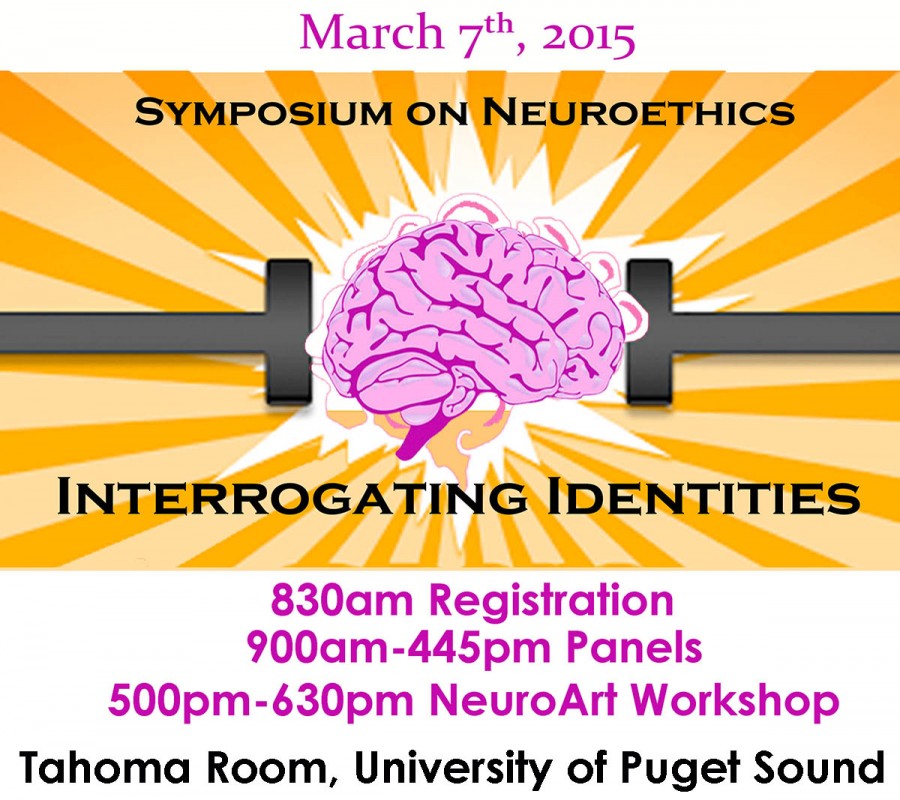Everyone is welcome to the free event: 8:30 a.m.–5 p.m. Saturday, March 7
TACOMA, Wash. – The New York Times headline declared: “Researcher Controls Another Person’s Brain Over the Internet.” The 2013 article described how the University of Washington researchers sent a brain signal from one person to another via the Internet that allowed the first person—through the power of thought alone—to make the other person move his finger and hit a button.
Incredible? Yes. Only the beginning? Very probably. Are there ethical concerns? Without a doubt.
The inaugural Symposium on Neuroethics: Interrogating Identities at the University of Puget Sound on Saturday, March 7, will address this and other ethical issues arising—amid a growing wave of public and professional concern—from our advances in understanding the brain.
The free event, open to the public, will run from 8:30 a.m. to 5 p.m. in the Tahoma Room, Commencement Hall, on campus. The symposium will include short talks, panel discussions, Q&A sessions, lunch, and coffee breaks. Registration is required, and space is limited. Please visit pugetsound.edu/neuroethics for more information and to register.
Neuroethics, an ethical look at neuroscience advances, is an emerging field as scientists and society face numerous new questions regarding brain research and where it will take us. Panelists and speakers at the symposium will include experts from the clinical and research professions and patients and social workers. Four major topics will be addressed during the daylong event:
- Ethical challenges in treating long-term mental illness: including a look at the experience of family members, confidentiality, access to treatment, cultural factors, and pharmaceutical treatments
- How brain research approaches questions involving gender and socioeconomic differences: including a discussion of the implicit bias that may affect researchers
- Brain-to-brain interfaces: a look at the risks that arise if someone’s intentions can control another person’s body, even if only partially, by altering what happens in their brain. The session includes scientists from the research center that conducted the “finger-movement” experiment above.
- Spinal cord injury and its effect on identity and mobility: A speaker, and a panel of individuals living with spinal cord injury, will explore how and why walking defines one’s identity after an injury. They will consider the current science in walking recovery and discuss who makes decisions about the focus of rehabilitation.
The symposium moderators, speakers, and panelists will include those below. Please visit the website for a full description of the presenters and topics.
Lisa Fortlouis Wood, professor of psychology, University of Puget Sound
Bob Winslow, member, National Alliance on Mental Illness
Lee Carlisle, associate professor, and physician, University of Washington
Joy Gimlett, advanced registered nurse practitioner, Comprehensive Life Resources
Siddharth Ramakrishnan, Jennie M. Caruthers Chair in Neuroscience, University of Puget Sound
Ann Fink, postdoctoral research fellow, Center for Neural Science, New York University
Courtney Stevens, associate professor of psychology, Willamette University
Eran Klein, staff neurologist, Portland Veterans Affairs Medical Center
Sara Goering, associate professor of philosophy and values in society, University of Washington
Suzanne Holland, John B. Magee Professor of Science and Values, University of Puget Sound
Jennifer Hastings, professor, and director, School of Physical Therapy, University of Puget Sound
Lynn A. Worobey, a research associate in physical medicine and rehabilitation, University of Pittsburgh
A NeuroArt Workshop will take place at the end of the symposium, 5–6:30 p.m. Artist Aisen Caro Chacin, from Parsons The New School of Design, in New York, will host the interactive workshop. Participants will participate in an exercise involving remote control of the vestibular system, which handles a person’s sense of balance and spatial orientation. Questions regarding ethics, regulation, and the “power of do-it-yourself” will be discussed. The workshop is restricted to 20 participants. Up to 25 audience members are also invited.
The Symposium on Neuroethics: Interrogating Identities is supported by a grant from the W.M. Keck Foundation, which helps Puget Sound create a more open “culture of neuroscience” on campus in the community. Organizers aim to address the important ethical questions involved in neuroscience practice and research and make the brain’s science more accessible for all. They invite students, faculty, and community members to hear about the discussions, debates, and dialogues that are a part of neuroscience.
To register and for more information, visit pugetsound.edu/neuroethics.
For directions and a map of the University of Puget Sound campus:pugetsound.edu/directions
For accessibility information, please contact accessibility@pugetsound.edu or 253.879.3236, or visit pugetsound.edu/accessibility.
Photo on page: Top left: PET scan of a human brain, by Jens Maus; Above left: Artist Aisen Caro Chacin
Tweet this: #Brain-to-brain and beyond. 1st Symposium on #Neuroethics @univpugetsound Sat. Mar 7 Public welcome. Free & fascinating http://bit.ly/1CqxLKP
Follow us on Twitter! twitter.com/univpugetsound


